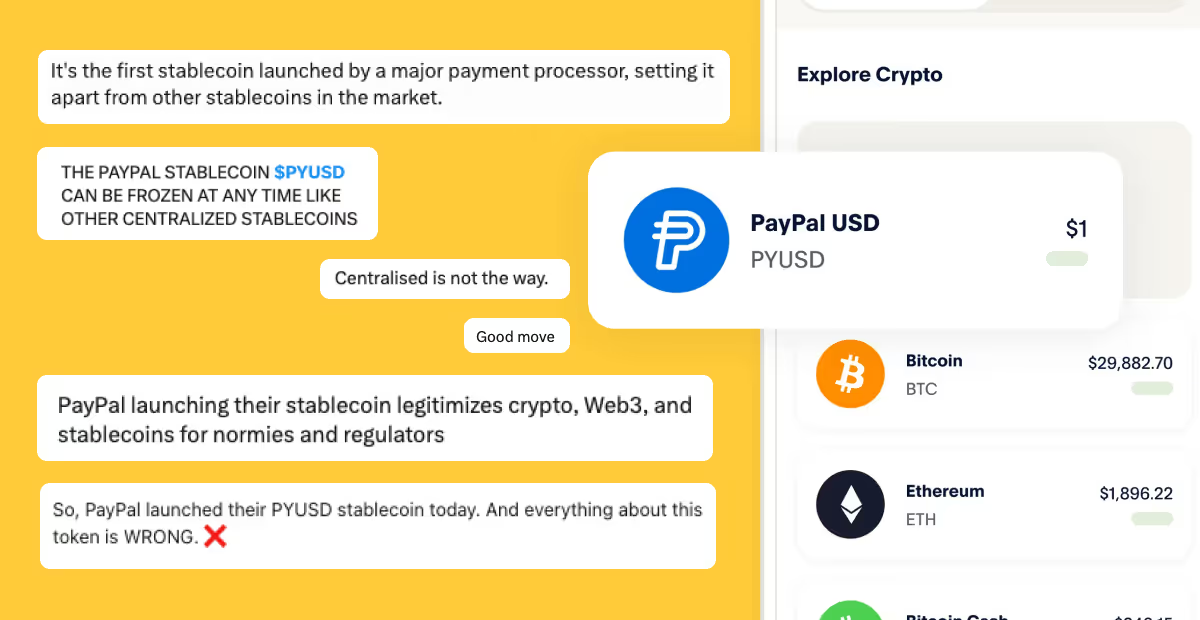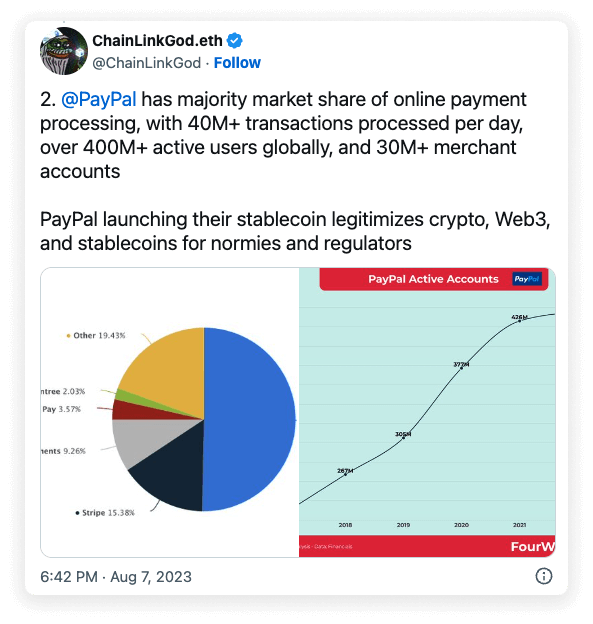PayPal's Stablecoin PYUSD: A Bridge Between Mainstream and Crypto, or a Step Backwards?



PayPal's stablecoin launch has become a topic of hot debate and discussion within the blockchain community. The announcement of PYUSD, a dollar-backed stablecoin, has stirred a mix of reactions. Some see it as an exciting stride towards mainstream adoption, while others express skepticism about its real impact and innovation. This article delves into the details of PayPal's stablecoin and explores the varied perspectives from the crypto and blockchain community to give an objective take.
PayPal's stablecoin, PYUSD, represents the first dollar-backed stablecoin from a major U.S. financial institution. Issued by Paxos Trust Company, PYUSD is supported by U.S. dollar deposits, short-term U.S. Treasuries, and similar cash equivalents. Redeemable 1:1 for U.S. dollars, PYUSD operates as an ERC-20 token on the Ethereum blockchain.
Today, we’re unveiling a new stablecoin, PayPal USD (PYUSD). It’s designed for payments and is backed by highly liquid and secure assets. Starting today and rolling out in the next few weeks, you’ll be able to buy, sell, hold and transfer PYUSD. Learn more https://t.co/53RRBhmNHx pic.twitter.com/53ur2KmjU7
— PayPal (@PayPal) August 7, 2023
PayPal envisions its stablecoin as a tool designed to reduce friction for payments in web3 and digitally native environments. They aim for PYUSD to facilitate fast transfers of value, enable direct flows to developers and creators, and foster the continued expansion into digital assets by the world's largest brands.
Eligible U.S. PayPal customers will benefit from various features of PYUSD. They can transfer it between PayPal and compatible external wallets, send person-to-person payments using PYUSD, fund purchases by selecting PYUSD at checkout, and convert between PayPal's supported cryptocurrencies and PYUSD.
The launch of PayPal's stablecoin has not been met without controversy.
Some in the crypto community hailed PayPal's stablecoin as a groundbreaking move. They believe it could significantly boost the adoption and innovation of digital currencies. Many blockchain developers welcome PYUSD as a bridge between fiat and web3, appreciating PayPal's reputation in the payments industry and their commitment to responsible innovation and compliance.

Contrarily, others criticize PayPal's stablecoin as a centralized and regulated token that lacks the true essence of decentralization. Some blockchain developers have questioned the need for PYUSD, given existing alternatives like USDC, DAI, or BUSD. Concerns about regulatory risks, centralization of control, lack of transparency, and innovation have also been raised. Critics argue that PYUSD is not a true cryptocurrency but a digital representation of fiat money that fails to offer the benefits of decentralization such as censorship-resistance, permissionlessness, and programmability.
PayPal's PYUSD represents an interesting convergence of traditional financial systems with the decentralized world of cryptocurrencies. While there is undeniable excitement about the potential of PYUSD to bridge gaps and create new opportunities, there are also genuine concerns about what it may mean for the future of decentralization. As PYUSD begins its journey in the crypto ecosystem, only time will tell whether it becomes a force for positive change or if the criticisms hold substantial weight.
Build blockchain apps faster with a unified framework for 60+ blockchain protocols.